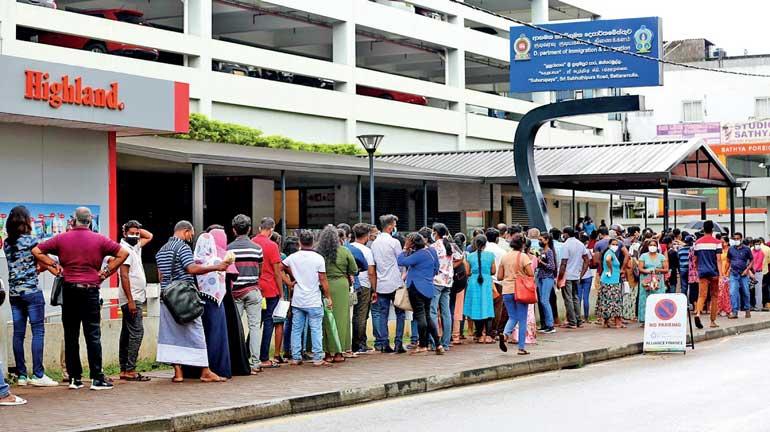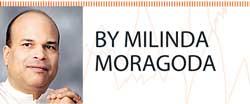22 May 2024 - {{hitsCtrl.values.hits}}
ALL FORECASTS INDICATE THAT SRI LANKA WILL NOT BE ABLE TO GROW AT MORE THAN 3 PERCENT FOR THE NEXT EIGHT YEARS OR SO

 Pathfinder Foundation Founder Milinda Moragoda released a statement saying Sri Lanka’s present oppressive tax regime is undermining the country’s economic growth agenda.
Pathfinder Foundation Founder Milinda Moragoda released a statement saying Sri Lanka’s present oppressive tax regime is undermining the country’s economic growth agenda.
Furthermore, Moragoda said that many local entrepreneurs and businesses that can afford it are relocating abroad and new investments have decreased significantly.
Full text of the statement:
While the demand compression it has created has, to an extent, stabilised the economy, it has made the poor more destitute and is driving the middle class towards poverty. Adversely affected professionals, skilled workers and others are reluctantly leaving the country in large numbers, exacerbating the brain drain and reducing our workforce.
Furthermore, many local entrepreneurs and businesses that can afford it are relocating abroad and new investments have decreased significantly. For these reasons, this tax regime is counterproductive to economic growth and unsustainable. All forecasts indicate that Sri Lanka will not be able to grow at more than 3 percent for the next eight years or so.
If this situation is to be corrected, the rate of taxation will have to be brought down. However, unpalatable it may be, this can only be achieved through a combination of deep reforms that will lead to small government (by reducing public expenditure), accelerated privatisation, large-scale foreign investment, increased connectivity at both a regional and global level and in general, creating a more business and investment-friendly climate.
In Sri Lanka, the vested interests are such that many of these proposed reforms will require strong political resolve to be implemented. Furthermore, Sri Lanka must diversify its income streams beyond worker remittances, garments, tourism and commodities to include new sectors. It is time for Sri Lanka to modernise its economy.
We have to realise that in the high-income countries of the Organisation for Economic Cooperation and Development (OECD), the average corporate income tax rate fell from 47 percent in 1980 to 23 percent in 2021. Many countries have cut tax rates on dividends, capital gains and estates and most countries that once had annual wealth taxes have abolished them. Unfortunately, Sri Lanka is going in the opposite direction, with wealth and estate taxes now being contemplated.
With national elections on the horizon, it is incumbent upon all political parties to step up and present proposals that outline a clear trajectory that will steer us towards economic recovery. It is high time that all political parties take this responsibility seriously and present a comprehensive set of proposals on tax policies. These proposals should aim to bring down individual, corporate and value-added taxes and other levies to levels that will make Sri Lanka competitive, spur growth and create rapid development.
Especially for countries like Sri Lanka, which have a bloated government sector, the path of least resistance is to increase revenues through taxation and tariffs to meet their day-to-day requirements to avoid long-needed reforms that go to the root of the problem. However, Sri Lanka cannot afford to continue on this path for the above reasons. A low-tax, growth-oriented, investor-friendly regime that is both fair and equitable to all Sri Lankan citizens and has a well-designed and targeted social safety net to protect the poor and vulnerable must be put into place.
22 Dec 2024 8 hours ago
22 Dec 2024 9 hours ago
22 Dec 2024 22 Dec 2024
22 Dec 2024 22 Dec 2024
22 Dec 2024 22 Dec 2024